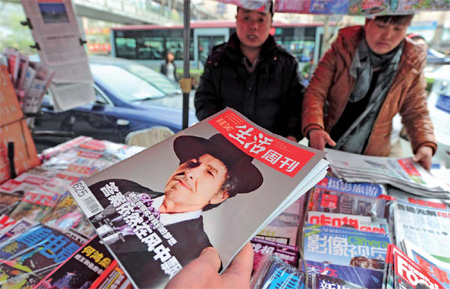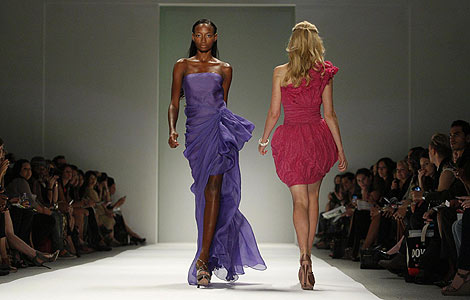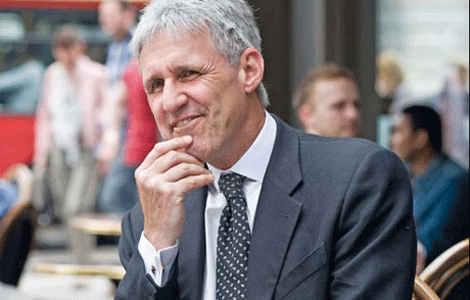Singing success
Updated: 2011-09-09 08:40
By Lin Jing (China Daily)
|
|||||||||
|
|
Western musicians bring much-needed impetus to live performance industry
Wei Ming is hopeful that American pop singer Lady Gaga will enthrall Chinese audiences with a livewire performance at the National Stadium in Beijing sometime next year despite controversies.
For Wei, the general manager of Beijing Gehua Live Nation Co, a leading live performance organizer, the Gaga visit would add to the string of successful performances by Western musicians in China over the last few years. Gehua Live was instrumental in bringing iconic pop artist Bob Dylan and Irish rock band Cranberries to China this year. The plethora of Western performers who are making a beeline to the Middle Kingdom in recent times has come as the much-needed adrenalin for the slumbering live performance industry.
"The changing market dynamics and improved spending power of Chinese citizens has put the live performance industry on the fast track to success," says Yang Hongbin, secretary-general of Beijing Trade Association for Performances.
The association says that there has been a considerable increase in the number of live performances and concerts in the city in the last two years. Ticket sales for concerts in Beijing rose from 140 million yuan ($21.9 million) in 2009 to 300 million yuan in 2010, a year-on-year growth of 114 percent.
Last year, the number of performances in Beijing reached 19,095, a 16.45 percent growth from 16,397 in 2009. Ticket sales from these performances exceeded 1.09 billion yuan.
With demand reaching its crescendo, many experts have dubbed 2011 the year of Western music in China.
The Eagles, the legendary American rock band, had two live performances in Beijing and Shanghai in March this year. These were followed by the Bob Dylan concerts.
Big pop stars like Justin Bieber and Rihanna are also expected to have sellout performances when they tour China next year, say industry sources.
Wei from Gehua Live says that a more open culture and better economic environment are positive triggers for the industry.
"In the past, Chinese fans did not have much access to Western music. Their choices were restricted to radio or cassettes. But with the growing popularity of the Internet, more Chinese are now abreast with the latest music trends and developments," says Wei. "These factors have contributed to the resurgence of the live performance industry in China."
Wei says Western singers still view China as a mysterious nation, but consider it an integral destination in their world tours.
"Many foreign singers coming to China are apprehensive on whether their audience would be made up of expatriates or Chinese," says Wei.
But such fears are unfounded. Bob Dylan wrote on his official website after his China tour, "If anybody wants to check with any of the concert-goers they will see that it was mostly young Chinese people that came. There were very few expatriates in the audience."
Wei says that the resurgence began in 2008 after several new venues like big stadiums and theaters were set up with ultramodern facilities. The presence of these facilities made negotiations with foreign agencies smoother, he says.
"Foreign singers have strict requirements about location, accommodation and equipment. Sometimes they ask for a particular type of international hotel. China has improved its infrastructure considerably after the Beijing 2008 Olympic Games and the World Expo 2010 in Shanghai."
Even as the industry bets big on its Western success, there is also a serious shortage of homegrown talent.
"The Chinese mainland lacks enough influential pop stars," says Luo Xiaochuan, general manager of Beijing All Culture Communication Co.
"The current situation is that local promoters have to focus on getting pop stars from Hong Kong or Taiwan every year for steady returns. But that window of opportunity is limited due to availability and travel plans. Most promoters are keen on roping in Western singers despite the long time process involved due to the higher gate receipts."
The average ticket rates for most performances also range from several hundred yuan to more than 2,000 yuan. The most expensive ticket for the Bob Dylan concert was around 1,961 yuan, while for the Eagles it was 2,580 yuan.
Ma Ran, marketing director with Wu Promotion Co, a Beijing-based promoter and event organizer, says that compared to local stars, foreign performers are scarce resources. It is impossible for them to have a China tour every year, he says.
Foreign performers also have wider ranges of songs and better performances.
"Chinese fans are willing to pay a high price to see the live performances of their longtime idols, let alone the fact that many international bands are coming to China for the first time," says Ma.
Despite the large market potential, there are still some obstacles.
The biggest hurdle is getting clearance from the local government officials, failing which marketing activities of the show come to a halt.
Gehua Live's Wei says that he normally gets just one month for marketing activities, while for the just-concluded The Cranberries concert it was only 20 days.
"Sponsorship is an integral parameter for performers and promoters. It not only promotes the performers' reputation and influence but also raises enough capital to ensure the quality and marketing of the shows," says Wei.
He says it is much easier to promote Chinese performances, because local singers undertake frequent visits to cities around the country and have a better understanding of the business model.
"Most international bands and singers, however, do not see any merit in ties ups or alliances with domestic brands. They focus more on direct returns from appearance fees rather than business collaborations."
Currently the international performances are concentrated in a few first-tier cities such as Beijing, Shanghai and Guangzhou.
But not all the fans live in these big cities.
"There is a huge market in second- and third-tier cities such as Wuhan, Chengdu and Xi'an," says Wei, adding that the investment and marketing in the initial stages would remain wasted if there are no follow-up activities.
"In the future, Chinese promoters may use the mature network of movie theaters to release 3D concert movies. Fans who are unable to attend the live performances due to other commitments can go to the cinemas and enjoy the concert in a 3D format."
(China Daily 09/09/2011 page10)












